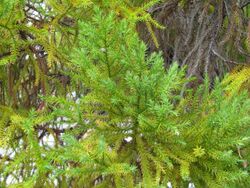Biology:Callitris macleayana
| Callitris macleayana | |
|---|---|

| |
| Scientific classification | |
| Kingdom: | Plantae |
| Clade: | Tracheophytes |
| Clade: | Gymnospermae |
| Division: | Pinophyta |
| Class: | Pinopsida |
| Order: | Cupressales |
| Family: | Cupressaceae |
| Genus: | Callitris |
| Species: | C. macleayana
|
| Binomial name | |
| Callitris macleayana (F.Muell.) F.Muell.
| |
Callitris macleayana is a species of conifer in the family Cupressaceae, endemic to Australia .[2][3] The tree is commonly known as stringybark pine, as well as brush cypress pine and Port Macquarie pine, although it does not belong to the pine genus or family.[1] Stringybark pine is found in two regions of Australia's East coast, one in the centre and one in the North.
Description
Callitris macleayana is a large, straight-trunked tree with spreading branches and up to 40 metres in height.[4] The bark is furrowed, and its juvenile leaves are around 1 centimetre in length, giving way to mature foliage of 2-3 millimetres; cones often occur in solitary on larger fruiting branches, and have 6 scales when borne on mature trees.[4]
Distribution and habitat
Stringybark pine occurs over much of the central and Northeast coast of Australia with an estimated range of 20,000 km2, although its range is divided in two with a 1500 km gap between the two occurrences. In the North, it is found in open forests upon humid highlands, mainly among Eucalyptus, Syncarpia, and Corymbia species; in the South, it is found in wet sclerophyll forests and occasionally in pockets of subtropical rainforest, the latter including Ficus and Podocarpus species.[1] Within these habitats the stringybark pine prefers exposed locations such as slopes and ridge tops, whilst generally being found in poorer soils.[1] The tree's limitation to humid sites is in contrast to many other species in the genus, such as Callitris glaucophylla and Callitris endlicheri. The species has a cold hardiness of -1.1 °C to +4.4 °C, corresponding to hardiness Zone 10.[5]
References
- ↑ 1.0 1.1 1.2 1.3 Thomas, P. (2013). "Callitris macleayana". IUCN Red List of Threatened Species 2013: e.T42203A2960816. doi:10.2305/IUCN.UK.2013-1.RLTS.T42203A2960816.en. https://www.iucnredlist.org/species/42203/2960816. Retrieved 18 November 2021.
- ↑ F.A. Zich; B.P.M Hyland (2020). "Callitris macleayana". Commonwealth Scientific and Industrial Research Organisation (CSIRO). https://apps.lucidcentral.org/rainforest/text/entities/callitris_macleayana.htm.
- ↑ Harden, G. J.; Thompson, J. (2001). "Callitris macleayana – New South Wales Flora Online". PlantNET – The Plant Information Network System. Sydney, Australia: The Royal Botanic Gardens and Domain Trust. http://plantnet.rbgsyd.nsw.gov.au/cgi-bin/NSWfl.pl?page=nswfl&lvl=sp&name=Callitris~macleayana.
- ↑ 4.0 4.1 Harden, G. J. (1990). Flora of New South Wales. Kensington, NSW: New South Wales University Press. ISBN 9780868401645. https://www.bookshops.com.au/isbns/0868401641.
- ↑ Bannister, P.; Neuner, G. (2001). Conifer Cold Hardiness. Kluwer Academic Publishers. pp. 3–22. ISBN 9789048155873. https://www.springer.com/gp/book/9780792366362.
Wikidata ☰ Q5022833 entry
 |


